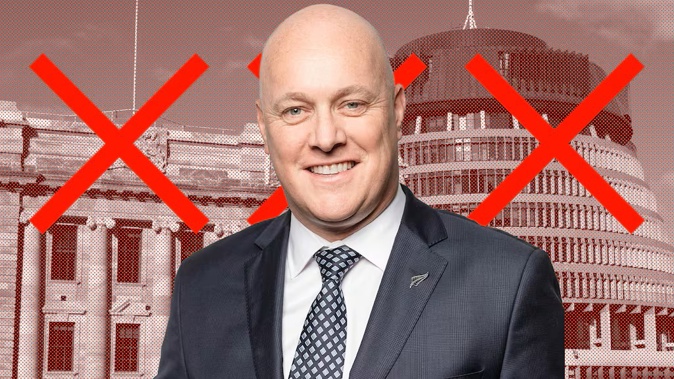
Prime Minister Christopher Luxon has swiftly dismissed concerns around the Government's re-introduction of the Three Strikes justice system, despite legal experts claiming the policy's effectiveness isn't backed by any substantial research.
The experts have claimed the studies around Three Strikes and its effectiveness are only based on overseas research and are conflicting.
Luxon, however, has said the legal fraternity's concerns are "a question for them" and backed the policy.
The Government is preparing to reintroduce mandatory prison sentences for violent and sexual criminals committing a third offence, this time only applying to sentences of more than 24 months. The policy will apply to the same 40 examples of serious violence, but strangulation and suffocation have been added to that list.
Courts Minister Nicole McKee made the announcement.
"Repeat offending does repeated harm to victims and communities, serious repeat offenders will face no parole for their second strike, and for their third strike they can expect the maximum sentence also without parole," McKee said.
Being introduced as a measure to tackle New Zealand's 30 per cent increase in violent crime, Three Strikes hasn't been met with glowing praise from certain corners of New Zealand's victim advocates - including Women's Refuge CEO Ang Jury.
Jury told Newstalk ZB this morning she wasn't entirely sure about the policy, claiming she'd been given no indication it would work, therefore it would be a matter of waiting and seeing.
"I'm not a huge fan of locking people up, I'm not sure it changes the behaviour and teaches them to be better at what they're doing, but in the absence of anything that's stopping some of this serious behaviour, the community does need to be safe," she told Mike Hosking.
But Jury's concerns for Three Strikes extended to women victims of domestic violence, who she said might find Three Strikes becomes a barrier to seeking the help they require.

"I do wonder whether there's going to be a reluctance on some victims who want help for their partner not having them locked up, whether there might be a reluctance to call police around some instances. I just don't know at this point."
Jury said there was "no magic bullet" when it came to resolving the nation's crime wave - if there was, she said, it would already have been fired. But in her role to advocate for the safety of women suffering domestic violence, Jury said it came down to whether this was the best option for the time being.
"If this is something that is going to help with [domestic violence], at least until such a time that a better answer is found, then it'll do its job."
The concerns raised by criminal defence lawyer John Munroe were based on the lack of quantitative and qualitative research supporting Three Strikes reduces crime. In fact, Munroe claimed certain studies indicated that crime increases under the policy.
He said New Zealand hasn't kept the Three Strikes policy in place long enough to study its impacts on prison populations and reoffending statistics, the most reliable research came from studies carried out overseas in California.
"And the studies, at least in California where most are coming from, some of the studies say it increases crime. But it's conflicting overall," he told Hosking this morning.
Munroe said judges having greater discretion would help with sentencing in general, but admitted the legal fraternity as a whole generally disagreed with Three Strikes because the evidence supporting it isn't there.

He said there was tension between ensuring New Zealand's communities were safe and ensuring people were punished fairly, but a large proportion of the fraternity disagreed with the Three Strikes process.
"I think the legal fraternity are best placed to comment on it because they see it first hand, they see how it works in practice with the law," he said.
"The public takes their view from the media sometimes, they see horrific crimes in the media and say 'Well ... throw away the key and lock them up', that's a person's instant reaction - even a lot of defence ministers. But we need to pause and slow down and look at individual cases and make sure they meet the ends of justice."
Later this morning, Luxon was asked by Mike Hosking where the evidence was that the Government had based the Three Strikes initiative off, considering the legal community was against the policy.
Luxon said the evidence was counter-factual.
"We had a Government last time which had one key target which was lowering the prison population, and low and behold violent crime is up 30 per cent. They repealed Three Strikes and did a whole lot of soft-on-crime stuff. None of that works," he told Hosking.
"So I'm prepared to try anything and everything that works, that's why we're putting 500 new police officers in, we're defunding the Section 27 reports ... and Three Strikes makes sense. I mean, go and talk to someone who's been the victim of serious violent or sexual offending and I don't care if it saves one person."
Hosking pushed the Prime Minister further, asking why the legal fraternity disagreed with Three Strikes.
Luxon said it was "a question for them" and reiterated his executive branch of Government in parliament was passing the law.
"We're making sure it doesn't capture low-level offences which was the problem last time, we're putting a 24-month cap in place, we're giving some discretion around things like mental health and we're giving a 20 per cent discount if one of those offenders admits guilt because we don't want to re-traumatise victims," he said.
"But the bottom line is these are serious, serious offenders and frankly we've got to have them off the street."
Take your Radio, Podcasts and Music with you









